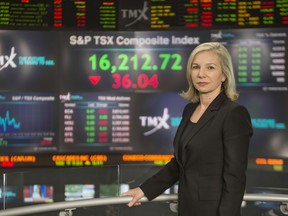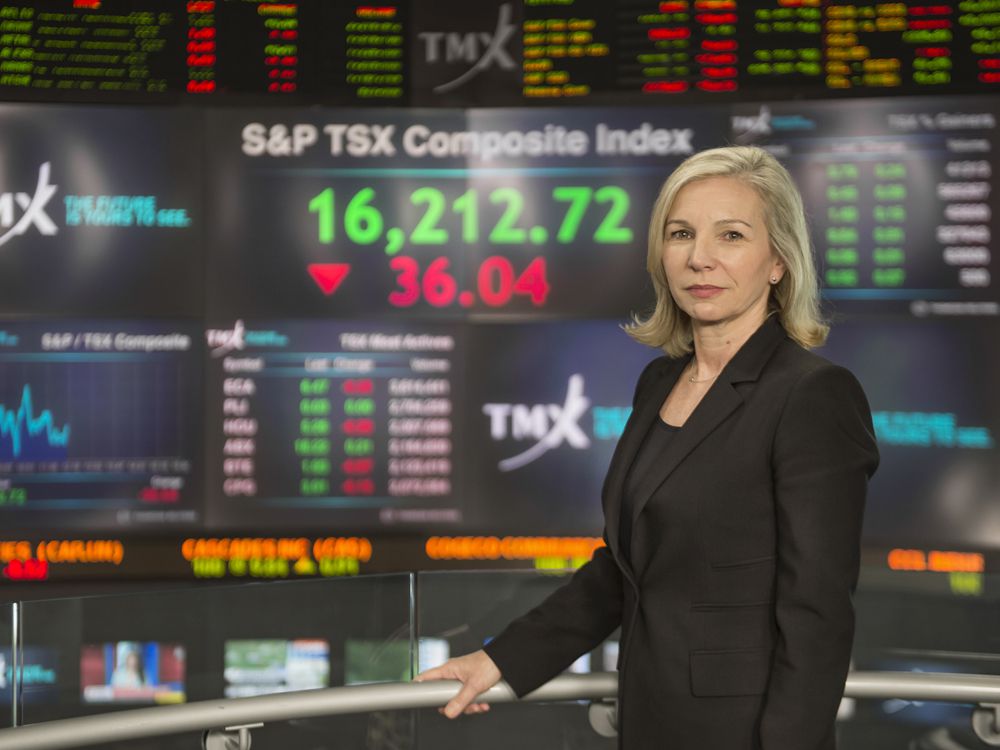The 57-year-old will officially step down as deputy chief economist at Royal Bank of Canada on March 31

Article content
Dawn Desjardins, one of the few women to hold a top position in Canadian economics, is set to retire at the end of the month after more than three decades of breaking down barriers and bringing women’s economic issues to the forefront in her research.
Advertisement 2
Article content
The 57-year-old will officially step down as deputy chief economist at Royal Bank of Canada on March 31, where she worked as chief economist Craig Wright’s No. 2 for 16 years, overseeing a team of six people.
“When I think about all the work I’ve done, the different positions and things, it’s that common thread of just being able to really connect with people and hear how this impacts what they’re doing,” she said, referring to the analysis of economic data and trends.
Armine Yalnizyan, the economist who coined the term “she-cession” to describe how the COVID-19 recession was having a disproportionate impact on women, said she hoped Desjardins would continue her work.
“One of the things she’s done throughout the pandemic is tell the story of the she-cession from the bank’s point of view,” Yalnizian said in an interview. “She’s done a very artful job that is helpful.”
Advertisement 3
Article content
In academia, women make up less than a third of senior-level positions in universities, according to the Canadian Economics Association, but pinning down recent data in the private sector is hard to come by. Among the six biggest banks, only Toronto-Dominion Bank’s economics department is led by a woman, Beata Caranci.
Desjardins’ career on Bay Street spanned 35 years. After graduating from the University of Toronto in 1987, she began as a research associate at Burns Fry Ltd., working under economist Sherry Cooper, who would go on to become chief economist at Bank of Montreal. That’s where Desjardins “cut her teeth” on the trading floor with the bonds team, viewing how markets reacted in real time to economic news.
Advertisement 4
Article content
Next came a brief stint at Wood Gundy Inc., a brokerage that’s now part of Canadian Imperial Bank of Commerce. Desjardins sold bonds, and quickly learned sales wasn’t for her. “I realized at that point I was a researcher,” she said. Then she began a 10-year career at JP Morgan’s Toronto office as a foreign-markets strategist, learning how bonds and interest rates interact on a global scale.
It was then she and her husband decided to take a pause. Desjardins stopped working for a couple of years to focus on building a family. She has two daughters.
After becoming a mother, the challenges of being a woman on Bay Street only grew. “Trying to be a mum and being at your office at seven in the morning every day, it’s hard,” Desjardins said. “But I did have a lot of people who were there for me.”
Advertisement 5
Article content
Desjardins had a brief stint at Bloomberg News as a reporter, but she again found herself wanting to analyze the data, rather than report on the analysis of others. That’s when she began the longest stretch of her career at RBC, starting out as a senior economist, before moving up to deputy chief economist in 2015.
Through it all, Desjardins found herself poking and prodding data to find out how women are underrepresented in the labour market, and analyze how their full employment would impact gross domestic product. She guided her economists to focus on unique narratives in economics to provide fresh analysis on subjects such as interest rates and provincial economies, and hot-button items such as inflation.
Advertisement 6
Article content
Internally, she helped balance the scales on the economics team, bringing on an equal amount of women to men and built an environment that fostered inclusion and valued unique perspectives.
“Everybody on the team enjoys working with her and they’re smarter and better at their job because of Dawn,” said Wright.
-

Fed hikes rates a quarter point in opening bid to curb inflation
-

Inflation surges to 5.7%, adding pressure on Bank of Canada to accelerate rate hikes
-

Higher oil prices give Chrystia Freeland more room to spend in April budget
Rannella Billy-Ochieng, an economist at RBC, said she will always admire Desjardins for helping shape her skills. Last year, Desjardins encouraged Billy-Ochieng, a self-described introvert, to deliver a keynote speech on the economic impacts faced by visible minorities. From that moment, Billy-Ochieng realized that was a skill she wanted to keep working on.
Advertisement 7
Article content
Desjardins also inspired her recruits by celebrating when their reports were picked up in the media.
“As a woman, when you see another woman celebrating your wins with you, it’s electrifying and you believe in yourself even more to garner confidence,” Billy-Ochieng said. “She really paved the way for younger, women economists.”
Fostering the development of younger economists is one of the things of which Desjardins is most proud.
“I’ve tried to do that in the latter part of my career, to just be there for people,” Desjardins said. “I think for leaders, that’s sort of the thing too, making sure you’re always there for people. It’s one of those things that, because I’ve benefited from, I hope I’ve been able to repay that in some way.”
• Email: bbharti@postmedia.com | Twitter: biancabharti


